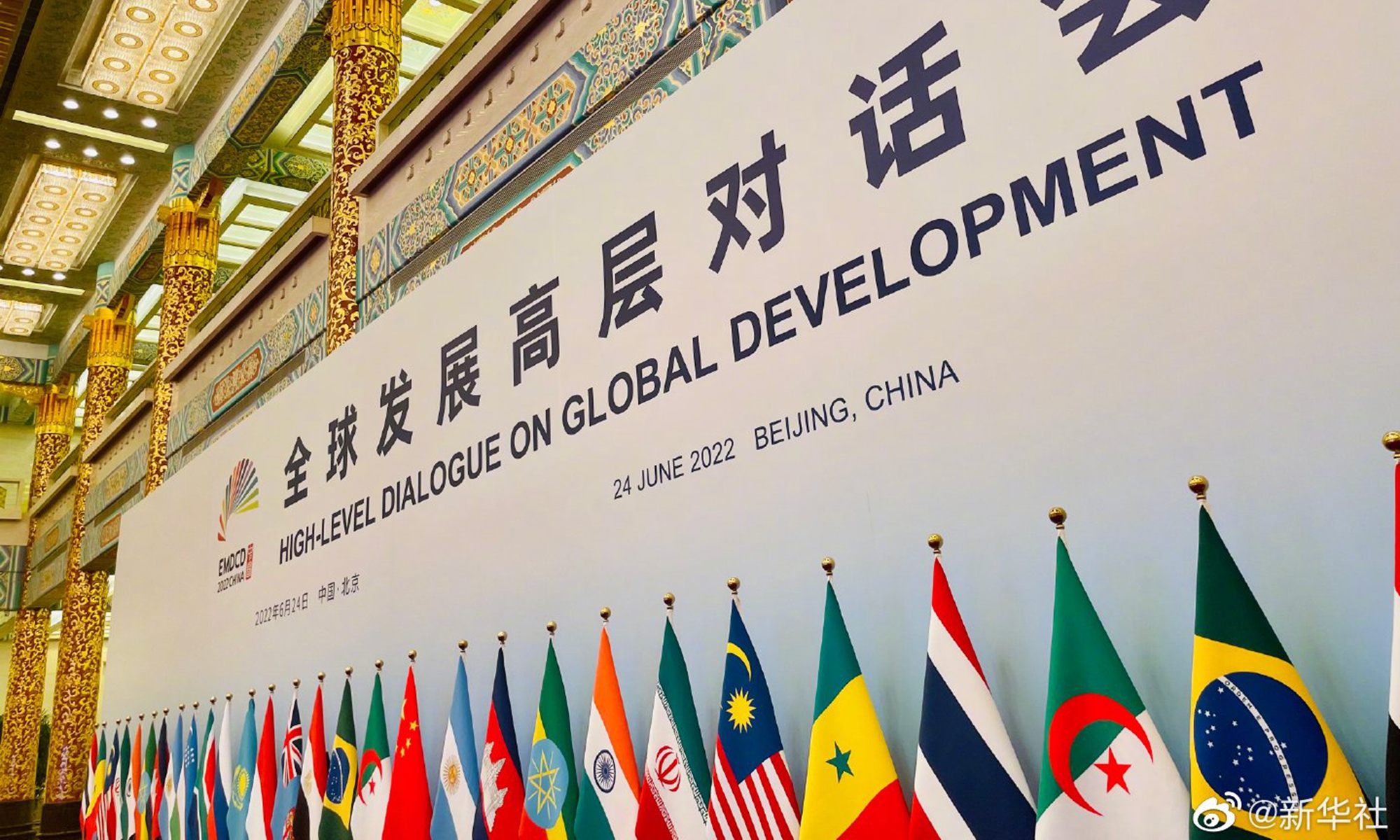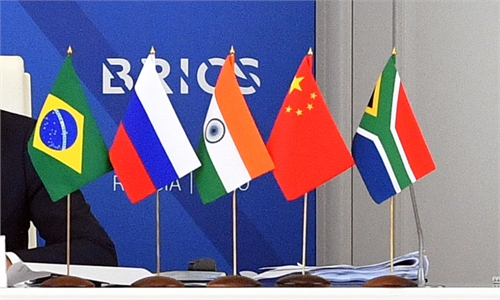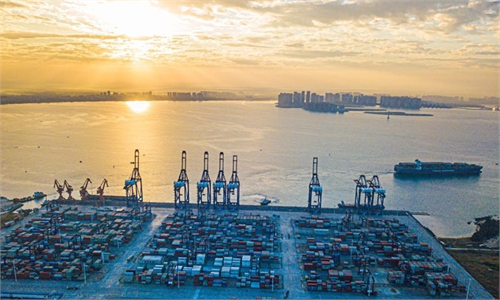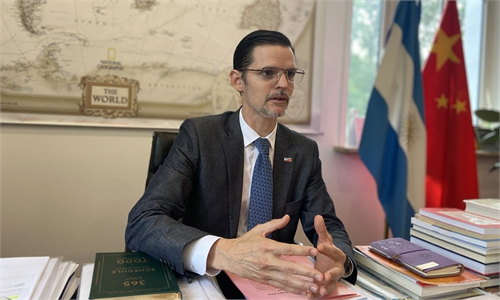Xi stresses placing devt at the center of intl agenda at global devt dialogue
China to add $1b to Global Development and South-South Cooperation Fund to support UN 2030 Agenda

Photo: Xinhua
Chinese President Xi Jinping highlighted the significance of placing development at the center of the international agenda when some countries have politicized and marginalized the development issue, built "a small yard with high fences," imposed maximum sanctions and stoked divisions and confrontation at Friday's High-level Dialogue on Global Development, stressing China will take pragmatic steps to continue supporting the UN 2030 Agenda for Sustainable Development, including adding $1 billion to a Global Development and South-South Cooperation Fund.
It is important that we put development front and center on the international agenda, deliver on the 2030 Agenda for Sustainable Development, and build political consensus to ensure everyone values development and all countries pursue cooperation together, Xi said while chairing the High-level Dialogue on Global Development in Beijing via video link on Friday evening.
He called on countries to build an open world economy and shape a global governance system and institutional environment that is more just and equitable.
Xi said protectionist moves will boomerang; anyone attempting to form exclusive blocs will end up isolating himself; maximum sanctions serve nobody's interest, and practices of decoupling and supply disruptions are neither feasible nor sustainable.
Friday's dialogue was taken after Thursday's BRICS Summit, and leaders from 18 countries attended Friday evening's event.
In addition to BRICS members, leaders from nations including Algeria, Argentina, Egypt, Indonesia, Iran, Kazakhstan, Senegal and Uzbekistan also attended the event.
Chinese analysts said the BRICS mechanism represents the future development direction of the world and a fast-emerging force that makes the world more equitable and inclusive, and most developing countries in the shadow of the US' attempt to weaponize the global economy and turn the world into a battleground of conflicts have seen the harm brought by bloc confrontations and are more determined to work with BRICS countries to strengthen and improve global governance.
Cooperation between BRICS nations and developing countries is pushing for a multipolar world, which is the future direction of the world order featuring balance, efficiency, equality and justice, when the US-led West tried to throw the world out of order with hegemony, unilateral sanctions and confrontation, analysts said.
Compared with US-led small cliques such as G7 and NATO, BRICS stands higher and sees farther and represents the future of the world, as BRICS aims to promote global progress through development. But US-led blocs try to turn the world into a battlefield for conflicts through underscoring absolute security, Wang Wen, a professor and executive dean of the Chongyang Institute for Financial Studies at Renmin University of China, told the Global Times on Friday.
To support the UN 2030 Agenda, Xi put forth the Global Development Initiative (GDI) at last year's UN General Assembly session, and he said China will take pragmatic steps to continue supporting the UN agenda.
China will upgrade the South-South Cooperation Assistance Fund to a Global Development and South-South Cooperation Fund, and add $1 billion to the fund on top of the $3 billion already committed, the Chinese president said.
Xi said China will advance cooperation with all sides to deepen global cooperation on poverty reduction, build capacity for food production and supply and promote clean energy partnerships.
The Dialogue issued a Chair's Statement saying leaders reached extensive consensus including commitment to multilateralism, development and people-centered approach.
And the Deliverables of the dialogue said China will take measures, such as providing 100,000 training opportunities for other developing countries to facilitate post-COVID economic recovery and social development, establishing an International Vaccines Research, Development and Innovation Alliance and officially launching the China-FAO South-South Cooperation Trust Fund Phase III of$50 million to support global development.
BRICS countries -Brazil, Russia, India, China, and South Africa -represent 40 percent of the world population, account for 25 percent of the global economy and 18 percent of world trade, and contribute 50 percent to the world's economic growth.
Chinese and foreign analysts believe the BRICS provides developing countries a platform to build consensus on addressing acute development challenges, and the GDI is an accelerator to achieving the UN development goals.
Wang Wen said one of the core tasks for achieving the UN Sustainable Development Goals (SDGs) is to end poverty, which is also the common goal for developing countries, and BRICS nations have made remarkable contributions to it. He noted BRICS nations are expected to turn the tide and help the world better achieve the UN 2030 Agenda with their experiences.
Carlos Watson, the Representative of the Food and Agriculture Organization of the United Nations in China, told the Global Times that BRICS countries, which account for more than 40 percent of the world's population and produce more than one-third of global cereal production, are well-placed to take a leadership role in helping eradicate global hunger and poverty by 2030. He said developing countries look to the success of BRICS countries in economic development over the past few decades as an example to follow.
The GDI has received warm responses from the international community, with more than 100 countries expressing their support. In January 2022, the Group of Friends of the GDI was launched at the UN, and more than 50 countries have joined the group so far, according to the Global Development Report, published by the Center for International Knowledge on Development on Monday.
BRICS Plus
Friday's event was attended by representatives of emerging markets and other developing countries aside from BRICS nations. Wang Wen believes the meeting was a format of "BRICS Plus" which demonstrated BRICS' openness, inclusiveness and flexibility, especially compared with the closed and exclusive G7.
As the BRICS chair country, China actively supports the BRICS in starting the membership expansion process and expanding the "BRICS Plus" cooperation, and China will encourage all BRICS parties to formulate standards and procedures for membership expansion based on consensus, Chinese Foreign Ministry spokesperson Wang Wenbin said at Friday's media briefing.
In the past years, each BRICS meeting invited different representatives of developing countries to better target that year's main task, and this year, BRICS invited countries including Indonesia, the G20 presidency, and Argentina, the representative of Latin America, Wang Wen said.
Argentina's Ambassador to China Sabino Vaca Narvaja told the Global Times that Argentina hopes to become a BRICS member as soon as possible. He noted that the BRICS cooperation mechanism has profound significance for the building of a more balanced global order where cooperation will be unconditional and for mutual benefit. If Argentina joins BRICS, this move would also be very conducive to the further development of China-Latin America relations, he said.
Carlos Martinez, a British author and independent political commentator, told the Global Times that the BRICS Summit can be expected to contribute to the construction of a fair, democratic and multipolar system of international relations and to forcefully represent the voice of the developing and emerging countries on crucial questions facing humanity.
How to construct a lasting world peace? How to prevent climate breakdown? How to defeat COVID-19 and prevent future pandemics? How to wipe out poverty? Such questions simply cannot be solved in a context where a handful of rich countries - posing as "the international community" - impose their will on the world. BRICS and "BRICS Plus" are powerful instruments for the construction of a democratic and just system of international relations, Martinez said.




